If there's one piece of cookware that's a non-negotiable for any kitchen, it's the Dutch oven. This sturdy, reliable cooking pot is an unsung hero in the culinary world - a versatile marvel that can transform your cooking experience. If you don't own one yet, here are compelling reasons why your kitchen needs a Dutch oven.
Unparalleled Versatility
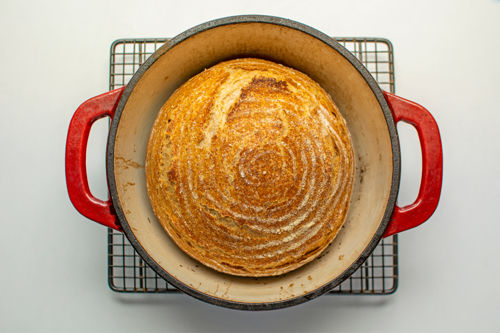
The Dutch oven is a real multi-tasker. Its unique design and features make it suitable for a vast array of cooking methods:
- Braising: The heavy lid and thick walls create a perfect environment for slow, moist cooking – ideal for tenderizing tougher cuts of meat.
- Roasting: Whether it's a whole chicken or a leg of lamb, the Dutch oven ensures even heat distribution for a perfectly roasted dish.
- Baking: Yes, you can bake in a Dutch oven! It's great for baking artisan breads, cakes, and even deep-dish pizzas.
- Stewing and Soups: The Dutch oven is a champion when it comes to long, slow cooking, making it perfect for stews and soups.
Superior Heat Retention
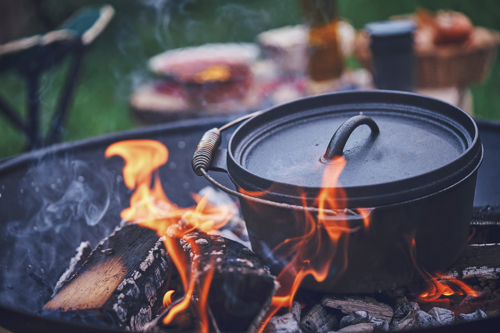
The Dutch oven's superior heat retention is one of its defining features, largely due to its heavy-duty construction, typically cast iron or enameled cast iron. This material is excellent at absorbing and distributing heat evenly, eliminating hot spots that can lead to uneven cooking or burning.
Not only does it heat up efficiently, but it also maintains that heat for an extended period, even after the stove or oven has been turned off. This makes it ideal for slow-cooking recipes like stews, braises, and casseroles, as it ensures your food cooks thoroughly and consistently, enhancing flavors and textures.
Built to Last
A Dutch oven is a long-term investment. Its robust construction ensures it can withstand high temperatures and frequent use. With proper care, it can last a lifetime, often becoming a cherished family heirloom. Here's how:
-
Quality Construction: Dutch ovens are typically made of cast iron, a material known for its durability and heat retention properties. This makes them resistant to wear and tear, even under high cooking temperatures.
-
Longevity: With proper care, a Dutch oven can easily last for 50 years or more. There are even stories of these versatile pots being passed down through generations, serving families for over a century!
To ensure your Dutch oven stands the test of time, here are some care tips:
-
Cleaning: Always clean your Dutch oven after each use to prevent food residues from damaging the enamel coating. Use warm soapy water and a soft sponge for best results.
-
Avoid Abrasive Materials: Don't use metal utensils or abrasive cleaners, as they can scratch the enamel surface. Opt for wooden or silicone utensils instead.
-
Temperature Control: Avoid subjecting your Dutch oven to sudden temperature changes, as this can cause the enamel to crack. Allow it to cool down before washing.
-
Storage: Store your Dutch oven in a dry place to avoid rust. If you're storing it with the lid on, place a paper towel inside to absorb any moisture.
Aesthetically Pleasing
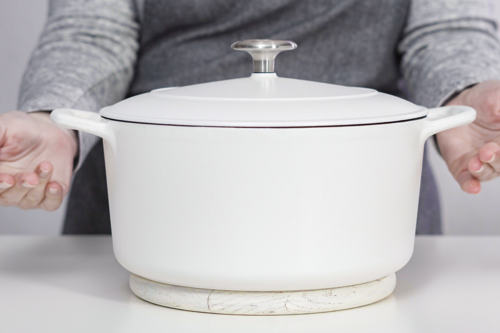
Who said cookware can't be stylish? With their enamel finishes in various colors, Dutch ovens look as good as they perform. They can go straight from the oven or stovetop to the table, enhancing the visual appeal of your meal.
Easy to Clean and Maintain
Dutch ovens are renowned for their sturdiness and convenience. Although they may appear rugged, these kitchen essentials are designed with simplicity and practicality in mind. Here's why they are easy to clean and maintain:
-
Enamel Coating: Most modern Dutch ovens feature an enamel coating. This not only enhances their aesthetic appeal but also has a practical purpose. The coating creates a smooth, non-stick surface preventing food from sticking to the pot and reducing the likelihood of baked-on messes.
-
Simple Cleanup: Cleaning a Dutch oven is straightforward. Usually, all it requires is some warm soapy water and a soft sponge to restore it to its original shine. This ease of cleaning makes Dutch ovens a practical choice for everyday cooking.
-
Maintenance Tips: While Dutch ovens are generally dishwasher safe, hand washing is recommended to preserve the integrity of the enamel coating over time. Avoid using harsh detergents or metal scouring pads, as these can damage the enamel coating.
Great Value for Money
While a Dutch oven may seem like a significant upfront investment, its durability, versatility, and performance make it excellent value for money. When you consider the variety of dishes you can prepare, it's worth every penny.
Enhances Food Flavor
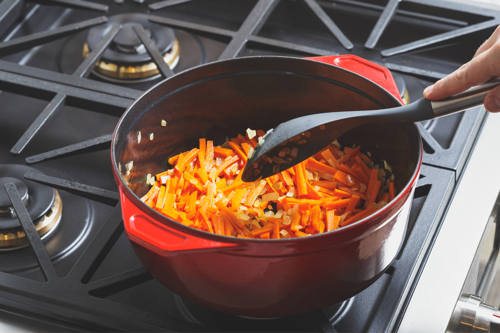
Lastly, but certainly not least, a Dutch oven can enhance the flavor of your food. Its tight-fitting lid traps steam, creating a moist cooking environment that keeps your food juicy and flavorful.
Here are some foods that can greatly benefit from being cooked in a Dutch oven:
-
Stews and Soups: The slow, even cooking process that Dutch ovens provide is perfect for stews and soups. It allows the flavors to blend beautifully over time, yielding hearty and comforting dishes.
-
Braises: Braising meats in a Dutch oven is ideal. The moist cooking environment tenderizes the meat while enhancing its flavor, resulting in succulent and tasty dishes.
-
Breads: Baking bread in a Dutch oven can yield fantastic results. The steam trapped inside the oven helps create a crispy crust, while ensuring the inside remains soft and fluffy.
-
Roasts: Roasting meats in a Dutch oven ensures they stay moist and tender. The enclosed environment allows the meat to absorb flavors from any herbs and spices added to the pot, enhancing the overall taste.
-
Casseroles: The even heat distribution provided by Dutch ovens is perfect for baking casseroles. It ensures all ingredients are cooked uniformly, resulting in a well-balanced and delicious dish.
Different Types of Dutch Ovens
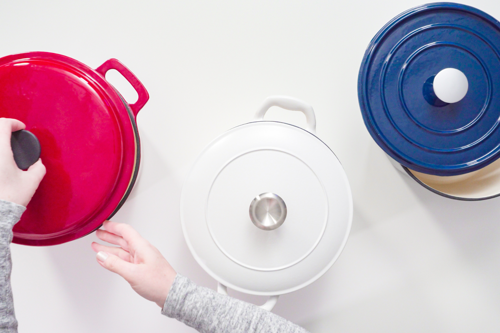
When it comes to versatile cookware, few items can match the utility and flexibility of a Dutch oven. However, not all Dutch ovens are created equal. They come in various types, each with unique features that make them suitable for different cooking methods. Here's a rundown of the main types of Dutch ovens:
-
Seasoned Cast Iron Dutch Ovens: This is the traditional type of Dutch oven, renowned for its superior heat retention and even distribution. It's an excellent choice for searing, frying, and baking. However, regular seasoning is required to maintain its non-stick properties and prevent rust.
-
Enameled Cast Iron Dutch Ovens: These Dutch ovens have the same heat properties as seasoned cast iron but feature an enamel coating. This coating prevents rust, eliminates the need for regular seasoning, and makes cleaning easier. It's perfect for slow-cooking dishes like stews and braises.
-
Stainless Steel Dutch Ovens: Although less common, stainless steel Dutch ovens offer a lighter alternative to cast iron. They heat up quickly but may not retain heat as effectively. The advantage is they're generally dishwasher safe, making cleanup a breeze.
-
Aluminum Dutch Ovens: Known for being lightweight and excellent at conducting heat, aluminum Dutch ovens are often the go-to choice for camping. They offer durability and lightness, making them easy to transport.
-
Ceramic Dutch Ovens: Ceramic Dutch ovens stand out for their aesthetic appeal, making them great for serving directly from the oven to the table. They're also microwave-safe. However, they're not recommended for stovetop use as they can crack under high heat.
Each type of Dutch oven has its distinct advantages and is suited to specific kinds of cooking. So, the best choice will depend on your individual cooking preferences and needs.
Final Thoughts
Dutch oven is more than just a pot. It's a culinary powerhouse that offers unmatched versatility, durability, and convenience. So why wait? Make this worthy addition to your kitchen today and take your cooking to new heights.
So, why not welcome this kitchen virtuoso into your home? Embrace the magic of slow, soulful cooking with a Dutch oven. After all, good things come to those who wait - and with a Dutch oven in your kitchen, you're in for some extraordinary meals that are worth every minute.








